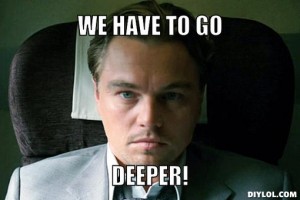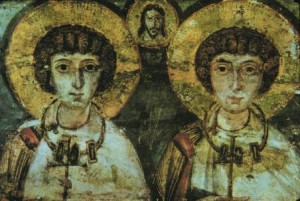Hell is one of those topics that makes people uncomfortable, like the female reproductive system, prostate exams, or being asked personal questions by complete strangers. However, unlike these other uncomfortable things, many people don’t believe in Hell. Many Christians in fact don’t believe in Hell. But I’m a little confused by this rejection. So, in an attempt to understand, I think it might be necessary to address the evil elephant cloud in the room and finally ask the question; what is Hell?
Ignoring the all too plausible explanation that hell is simply being overrun by giant cloud demons in the form of animals, we have to admit that Hell means something different to different people. For your average fundamentalist, Hell is that place where all of us sinners are going for our (insert sin here). Equally said, for your average atheist (not even atheist, agnostic, nihilist, post-structuralist, arm-chair social critic, etc. etc.) Hell is a myth. It’s a myth to scare children into doing what their told, and to give old people a place to tell you where your lifestyle is going to get you.
From a Western perspective this makes a lot of sense, since in the West hell is usually thought of as something like this:
A fiery pit of physical suffering where people who didn’t do what was right suffer for all eternity for their wrong-doing. But if this material type of suffering is all we got out of Dante’s description of the Pit then we’ve missed something integral.
However, this is what the West (in popular discourse and understanding, not necessarily in doctrinal teaching) has retained in their thought of Hell. And so, the secularist sees this and shouts,
And, to be honest, I have to agree with them. However, I still believe in Hell. But how can I?
In the Eastern Church (no, the West is not the only Christian heritage there is, sorry to burst your bubble) Hell is taken to be something a little different. Unlike the fire and brimstone vision of the (in my opinion too) physical description of Hell seen in the Western traditions (Latin Catholics and Protestants) the Eastern Christian depiction of Hell is something more along the lines of this:
The classic novel “Crime and Punishment” is one of the most vivid descriptions of the Eastern Christian view of Hell. And to make a very (very (seriously it’s like 211,000 words)) long story short, Dostoevsky sums up Hell in a short sentence:
“What is hell? I maintain that it is the suffering of being unable to love.”
This seems kinda limp on its own, but consider the abject suffering of Raskolnikov (for those of you who haven’t read Crime and Punishment, he’s the main character who kills two women and then deals with the burden of the guilt). For Raskolnikov it is not the guilt which he says is “torturing” him, but rather his friends and family and the love and attention that they give him in his poor health. This torture is not just guilt, but physical illness and delirium which is brought on by the love and care of these people (worst of all, a young woman with a golden heart who sacrifices herself for her family) that he simply can’t return. Thus, in an odd way, Sartre is right to say that “Hell is other people.”
But this seems like an earthly sort of hell. A reality experienced in life, not some sort of horrific after life. Well, I’m getting to that.
If being surrounded by loving relatives, friends, acquaintances, and even strangers is, for the one incapable of love, is hell, then being in the presence of one who is Love Incarnate would be… double hell? Hell times infinity? Well, naming it isn’t the point, you get the picture, it would be more horrific than we can imagine. And THIS is what the Christian East describes Hell as.
But wait! Isn’t hell the absence of God?
This is a pretty commonly held notion (even among well read Christians), but I would have to disagree simply on the basis that true absence of God would mean not existing, and this would mean God willfully taking you out of existence, and that’s not all that loving.
Instead, the Eastern view of Hell is that it is precisely the presence of this love which makes Hell… well, Hell. But how is God in Hell? Well, for this I must again appeal to a much wiser source than I, this time a professor of theology. Dr. Regis Martin discusses exactly this issue in his book “The Suffering of Love”. For my purposes I will elaborate simply on what happened on Holy Saturday, the day between the Cross and the Resurrection.
In the Eastern Church, this is referred to as the “Harrowing of Hell.” The West tends to refer to it as the “Descent into Hell.” I can hear the cry already, “Where is that in Scripture?”
Well, it’s not stated, but there’s really nothing else that the Scriptures could mean when they say that he died. The dead, in Judaic tradition, all went to a place called Sheol. Thus if Christ died, he also went to Sheol. However, unlike everyone before Him, he would rise victoriously from Sheol taking His loving servants with Him, but I digress. It’s right there in the Scriptures. And if you still don’t believe me, I appeal to a higher authority, Protestant reformer John Calvin when he says that
“Christ’s descent into Hell was necessary for Christians’ atonement, because Christ did in fact endure the penalty for the sins of the redeemed”
This is the Hell that I believe to be the most true, that you cannot love and yet are loved infinitely. You are in a place where even God Himself has suffered for you, and you reject it. If Dostoevsky’s depiction of Raskolnikov is to be believed at all, then this is the worst sort of suffering, a suffering which cannot be gotten away from. This is a Hell that I think we should all be afraid of, even if we think it’s a myth, even if we don’t believe in a God, even if we think it’s a story told to scare children, or a clever literary device used to make fun of popes without getting in trouble. No matter what, we should all be afraid that we could become incapable of love. We would all like to think of this as a fiction, no one can be incapable, but if you lived your whole life without doing it, then what’s the difference between that and not being able to? So, it is incumbent upon us all to live in fear of THIS Hell, of looking back and realizing we didn’t love.














